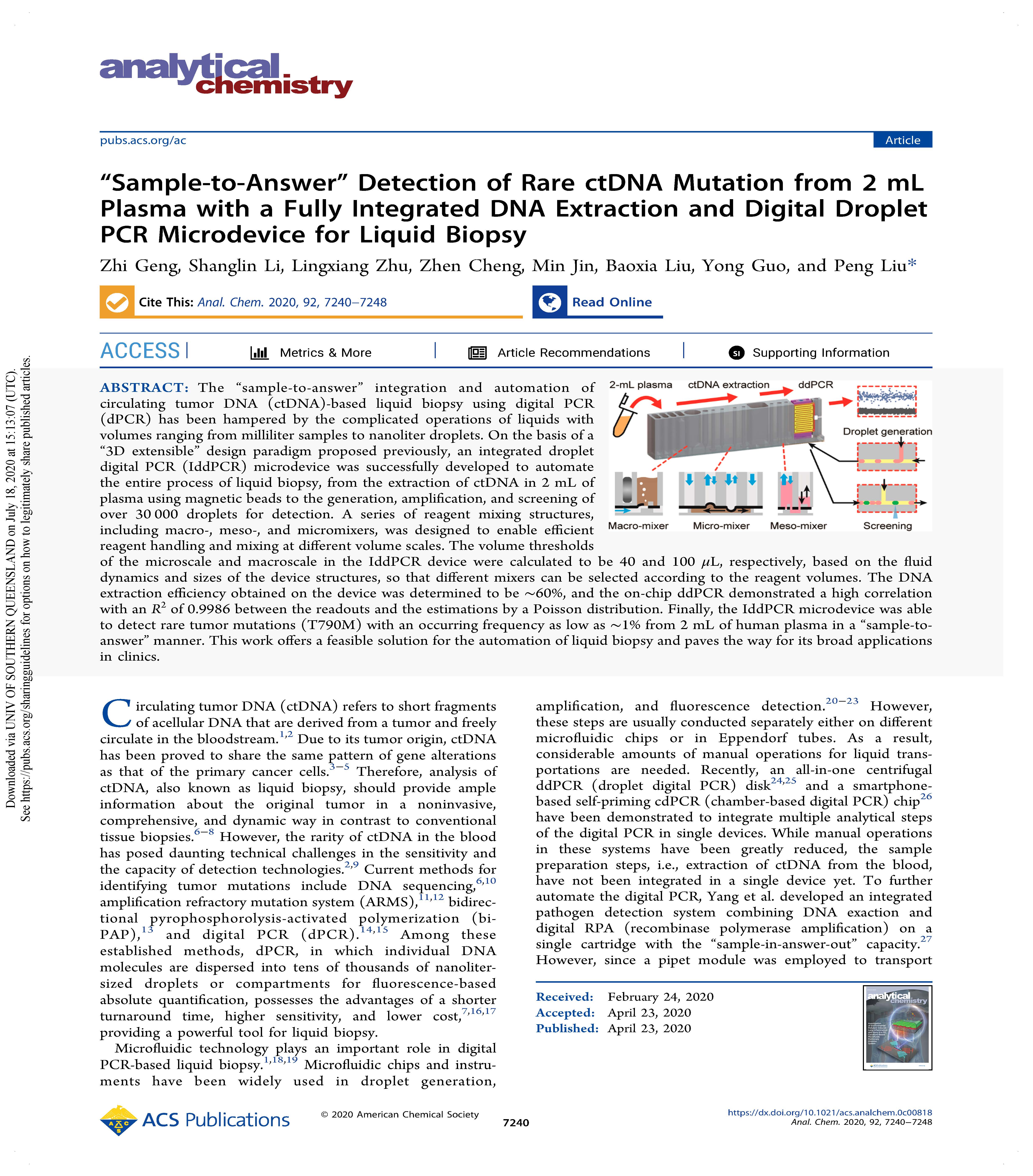release date:2022-02-28
 The “sample-to-answer” integration and automation of circulating tumor DNA (ctDNA)-based liquid biopsy using digital PCR (dPCR) has been hampered by the complicated operations of liquids with volumes ranging from milliliter samples to nanoliter droplets. On the basis of a “3D extensible” design paradigm proposed previously, an integrated droplet digital PCR (IddPCR) microdevice was successfully developed to automate the entire process of liquid biopsy, from the extraction of ctDNA in 2 mL of plasma using magnetic beads to the generation, amplification, and screening of over 30 000 droplets for detection. A series of reagent mixing structures, including macro-, meso-, and micromixers, was designed to enable efficient reagent handling and mixing at different volume scales. The volume thresholds of the microscale and macroscale in the IddPCR device were calculated to be 40 and 100μL, respectively, based on the fluid dynamics and sizes of the device structures, so that different mixers can be selected according to the reagent volumes. The DNA extraction efficiency obtained on the device was determined to be ∼60%, and the on-chip ddPCR demonstrated a high correlation with an R2 of 0.9986 between the readouts and the estimations by a Poisson distribution. Finally, the IddPCR microdevice was able to detect rare tumor mutations (T790M) with an occurring frequency as low as ∼1% from 2 mL of human plasma in a “sample-to-answer” manner. This work offers a feasible solution for the automation of liquid biopsy and paves the way for its broad applications in clinics.
The “sample-to-answer” integration and automation of circulating tumor DNA (ctDNA)-based liquid biopsy using digital PCR (dPCR) has been hampered by the complicated operations of liquids with volumes ranging from milliliter samples to nanoliter droplets. On the basis of a “3D extensible” design paradigm proposed previously, an integrated droplet digital PCR (IddPCR) microdevice was successfully developed to automate the entire process of liquid biopsy, from the extraction of ctDNA in 2 mL of plasma using magnetic beads to the generation, amplification, and screening of over 30 000 droplets for detection. A series of reagent mixing structures, including macro-, meso-, and micromixers, was designed to enable efficient reagent handling and mixing at different volume scales. The volume thresholds of the microscale and macroscale in the IddPCR device were calculated to be 40 and 100μL, respectively, based on the fluid dynamics and sizes of the device structures, so that different mixers can be selected according to the reagent volumes. The DNA extraction efficiency obtained on the device was determined to be ∼60%, and the on-chip ddPCR demonstrated a high correlation with an R2 of 0.9986 between the readouts and the estimations by a Poisson distribution. Finally, the IddPCR microdevice was able to detect rare tumor mutations (T790M) with an occurring frequency as low as ∼1% from 2 mL of human plasma in a “sample-to-answer” manner. This work offers a feasible solution for the automation of liquid biopsy and paves the way for its broad applications in clinics.
See all: https://dx.doi.org/10.1021/acs.analchem.0c00818